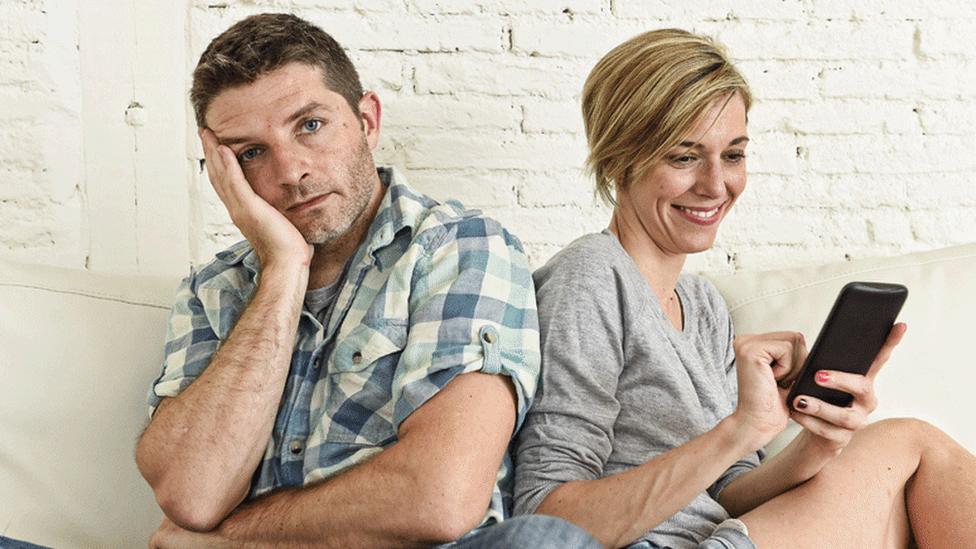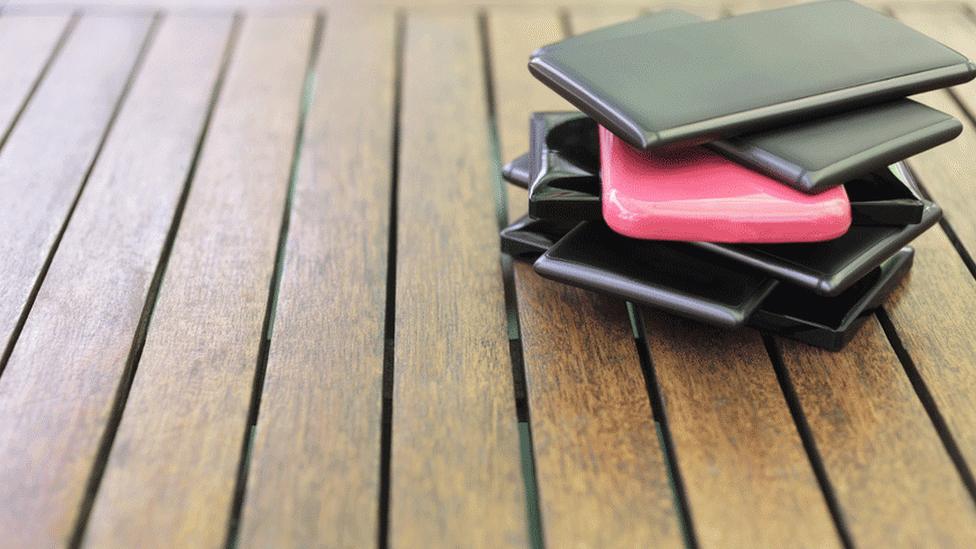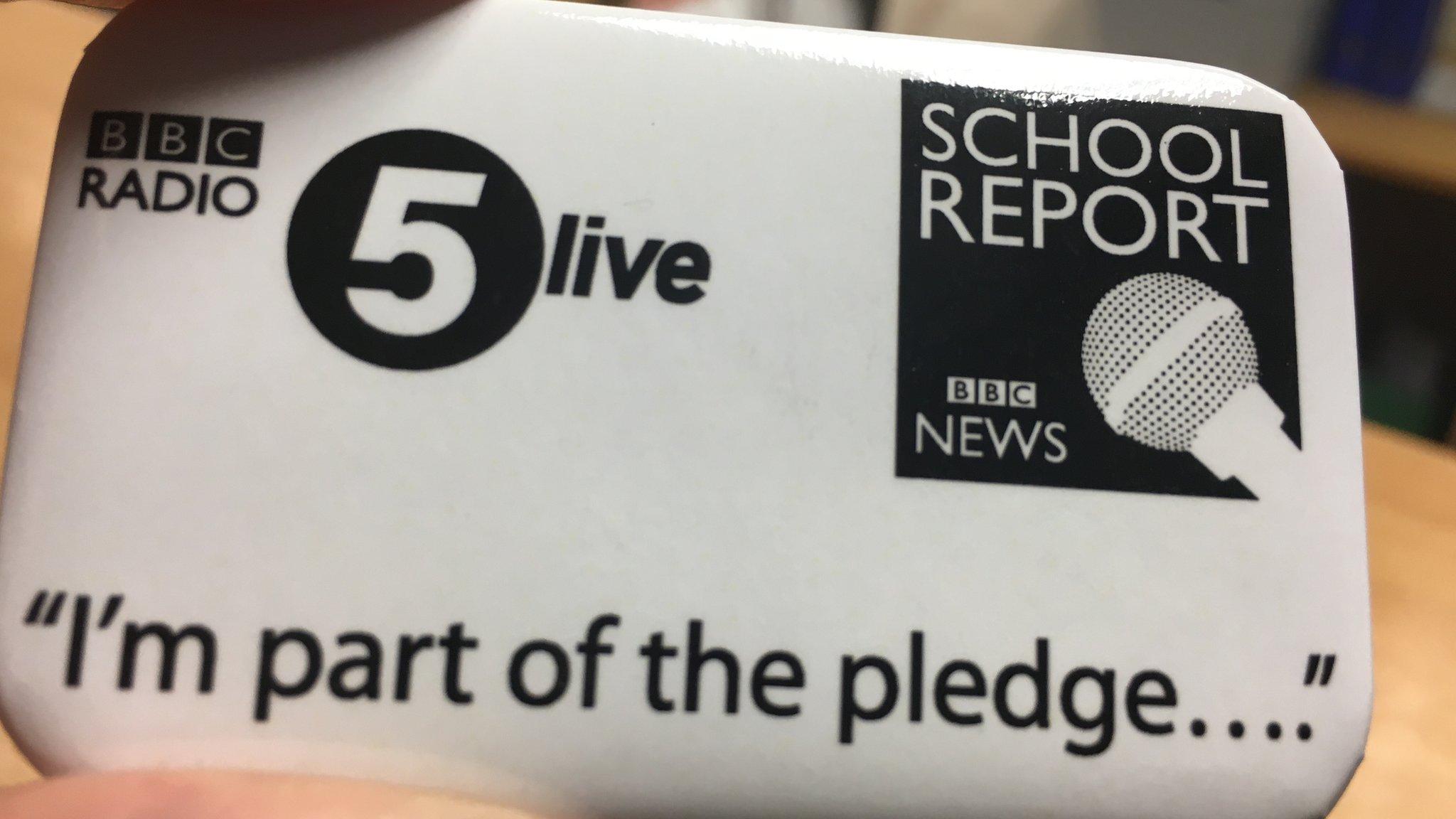Net overload 'sparks digital detox for millions of Britons'
- Published

Does this situation seem familiar? Just over a quarter of adults said they texted another person while in the same room as them
Internet overload has led millions of people in the UK to take a "digital detox", according to research from regulator Ofcom.
The survey found 34% of internet users have taken a period of up to a month away from the web.
Some 59% of those surveyed considered themselves hooked on their devices, with a third saying they found it difficult to disconnect.
Half said that they spent longer online than originally intended each day.
The study of 2,025 adults and 500 teenagers forms part of Ofcom's annual Communications Market Report, external, which assesses the state of the digital nation.
Ofcom director explains why people are choosing to take a "digital detox".
One quarter of teenagers said that they had been late for school as a result of being online, while six in 10 said that they neglected schoolwork.
As a consequence, parents are increasingly taking devices away from children or restricting their usage.
Adults too are noticing that over-reliance on technology can have social consequences. Four in 10 felt that they were regularly ignored by a friend or relative who was too engrossed in their smartphone or tablet.
A typical adult spends an average of 25 hours online per week, with nearly half (42%) saying they go online or check apps more than 10 times a day, the research suggests.
One in 10 accessed the internet more than 50 times daily, according to the study.
Reliance on the internet seems to be affecting people's personal and working lives, leading one in three (34%) to seek a period of time offline.

Some people access the internet more than 50 times a day
A quarter (25%) of those who said they had spent a period of time without the internet said they had done it for between half a day and a full day, while two in ten had done so for up to a week. A much smaller proportion of people had done it for longer than a week.
Holidays are seen as a good time to switch off with 16% of travellers choosing destinations with no internet access and 9% actively seeking places with no mobile signal.
"Facebook is probably my favourite - everyone is on there"
When asked why they were taking tech timeouts, 44% said it was to spend more time doing other things and 38% said to spend more time interacting with friends and family.
A third said that they felt more productive as a result of their detox, with a quarter saying they enjoyed life more without the constant attention of the web.
The research also looked at how far connectivity has spread.
By the end of 2015, 9.2 million fixed broadband connections were superfast and 4G accounted for almost half of all mobile subscriptions, it found.

Phone stacking - where friends agree to pile their phones on the dinner table - is becoming a thing
Some 71% of UK adults now own a smartphone.
According to Andrew Przybylski, an experimental psychologist at the Oxford Internet Institute, the research reflects a growing paradox in everyday life.
"Three in four say it brings us in closer touch, but nearly one in two think technology can get in the way," he said.
He added that it was important to understand that the survey was not a study of internet addiction.
"That is not a recognised psychiatric disorder. This is more about everyday frustrations, not something as serious a problem as gambling or alcohol use."
The study suggested that the under-25s were the most likely to unplug and unwind, and this is increasingly being reflected in social trends such as phone stacking - where groups out for dinner pile their phones in the centre of the table.
And bars, such as the Gin Tub in Sussex, are blocking mobile signals on their premises in an attempt to encourage face-to-face conversation.

Have you ever had 'net overload' or have you ever felt addicted to your mobile? How has it affected your life and well-being? Have you ever done a digital detox? What are your tips? Share your experiences by emailing haveyoursay@bbc.co.uk, external.
You can also contact us in the following ways:
WhatsApp: +44 7525 900971
Tweet: @BBC_HaveYourSay, external
Send pictures/video to yourpics@bbc.co.uk, external
Text an SMS or MMS to 61124 (UK) or +44 7624 800 100 (international)
- Published2 August 2016

